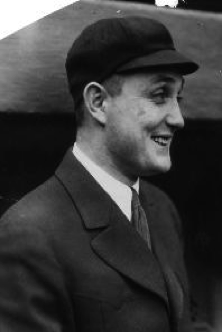(Elected to Baseball’s Hall of Fame in 1973)

Billy Evans grew up in Youngstown, Ohio and attended Rayen where he was an outstanding athlete, excelling at baseball, football, and track. Billy then spent two years at Cornell University playing baseball but returned to Youngstown when his father died in 1904. The city editor of the Youngstown Daily Vindicator was impressed with Billy’s writing ability and hired the young college athlete as the paper’s sports writer. Once when the aspiring reporter was covering a baseball game between the Youngstown Ohio Works Club and a team from Homestead, Pennsylvania, he was approached by the manager of the local club and asked to fill an umpire vacancy. Evans wasn't interested until it was mentioned he would be paid $15 for officiating one game, a figure equivalent to a week's salary at his sports writing job.
More umpiring came Billy’s way in the Ohio-Pennsylvania League, a Class C Division of the minor leagues. Then in 1906, at the age of 22, he moved up to the major leagues, being the youngest umpire in baseball history and the only umpire of his era who never played professional baseball.
Billy Evans spent his next 22 years umpiring in the American League, having the opportunity to umpire in six World Series. It was in the 1909 World Series that Evans became the youngest umpire to officiate, being only 25 years old. History tells us that baseball umpires during the first quarter of the 20th Century often worked single-handed like the time in 1907 when Evans umpired seven double-headers in eight days. His umpiring career was also capped with several other unusual events. It was in the September 16, 1907, doubleheader between the St. Louis Browns and Detroit Tigers, when Evans suffered a skull fracture when a bottle hurled by an angry spectator knocked him unconscious. Then there was the game when he shouted, "Foul ball!" The ball in question hit a pebble and rolled fair. In response to howls of wrath from the dugout of the team at bat, Mr. Evans said: "Well, it would have been a fair ball yesterday and it will be fair tomorrow and for all years to come. But right now, unfortunately, it's foul because that's the way I called it." What his statement amounted to was an admission that, although an umpire cannot always be right, he must stick by his decision.
At age 43 Evans retired from umpiring following the 1927 season. His 3,319 career games ranked fifth in major league history; his 1,757 games as a home plate umpire ranked third in AL history. Upon retirement he became the general manager of the Cleveland Indians. In this capacity, Evans was credited with taking the Indians from a second division to a first division team. He served as general manager for the next eight years, until budget cuts forced him out in 1935. Evans soon found work as chief scout and head of the Boston Red Sox farm system, but left on October 8, 1940 after the team sold Pee Wee Reese to the Brooklyn Dodgers over his objections.
On December 16, 1946, Evans accepted a contract offer from the Detroit Tigers to become their general manager. One of his first moves was dramatic – selling aging superstar Hank Greenberg to the Pittsburgh Pirates. Evans authored countless articles, as well as two books, Umpiring from the Inside (1947) and Knotty Problems in Baseball (1950). Billy Evans died at the age of 71. Funeral services were held in Cleveland and his remains were interred at Knollwood Cemetery, in Mayfield Heights, Ohio.
